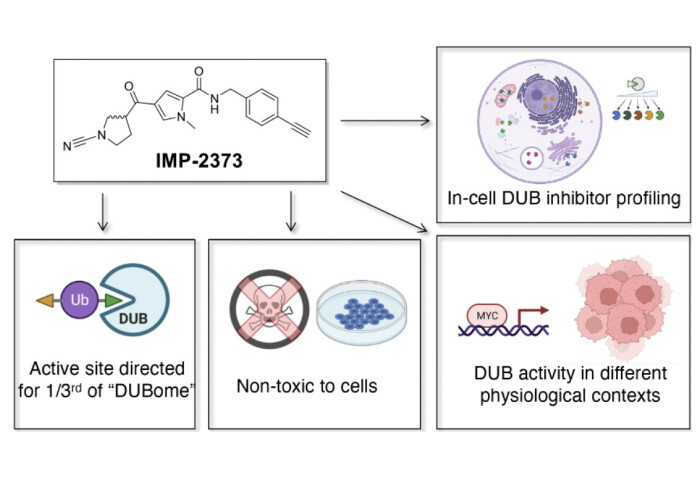A Small Molecule Probe Offers New Insights into Deubiquitinase Biology

Tate researchers working with Pfizer have developed the first cell-permeable broad-spectrum DUB probe enabling activity profiling in living cells.
In a new report in Angewandte Chemie "Discovery of a Potent Deubiquitinase (DUB) Small Molecule Activity-based Probe Enables Broad Spectrum DUB Activity Profiling in Living Cells" in close collaboration with scientists at Pfizer, Dan Conole and Fangyuan Cao in our lab describe their discovery and application of a cutting-edge small molecule probe, IMP-2373, which has the potential to transform our understanding of Deubiquitinases (DUBs) and their role in disease.
DUBs, a family of over 100 proteases, play a crucial role in regulating protein degradation and signalling by hydrolysing isopeptide bonds linking ubiquitin to protein substrates. Dysregulation of DUB activity has been linked to a range of diseases, including cancer, neurodegeneration, and inflammation, making them attractive targets for therapeutic intervention. Until now, researchers have primarily relied on ubiquitin-derived covalent activity-based probes (ABPs) to study DUB activity. However, the limitations of these probes, including their large recognition element which means they cannot enter inact cells, have hindered their application in live cells and organisms.
We identified cyanopyrrolidine (CNPy) probe IMP-2373 as a small molecule pan-DUB ABP, enabling the monitoring of DUB activity directly in intact, physiologically relevant live cells. Through comprehensive chemoproteomic warhead profiling, we found that IMP-2373 can quantitatively engage with more than 35 distinct DUBs across various cell lines at non-toxic concentrations. We also report examples of applications including tracking changes in intracellular DUB activity during pharmacological inhibition, and during MYC deregulation in a model of B cell lymphoma.

Our probe offers a complementary tool to ubiquitin ABPs, allowing scientists to monitor dynamic DUB activity within the context of disease-relevant phenotypes. The potential applications of IMP-2373 are far-reaching, and mark and important step forward in our ability to study and target DUBs, opening up new avenues for research and therapeutic development in areas including as cancer, neurodegenerative diseases, and inflammation, as well as a starting point for next generation DUB ABPs.
Article text (excluding photos or graphics) © Imperial College London.
Photos and graphics subject to third party copyright used with permission or © Imperial College London.
Reporter
Dr Thomas J Burden
Department of Chemistry